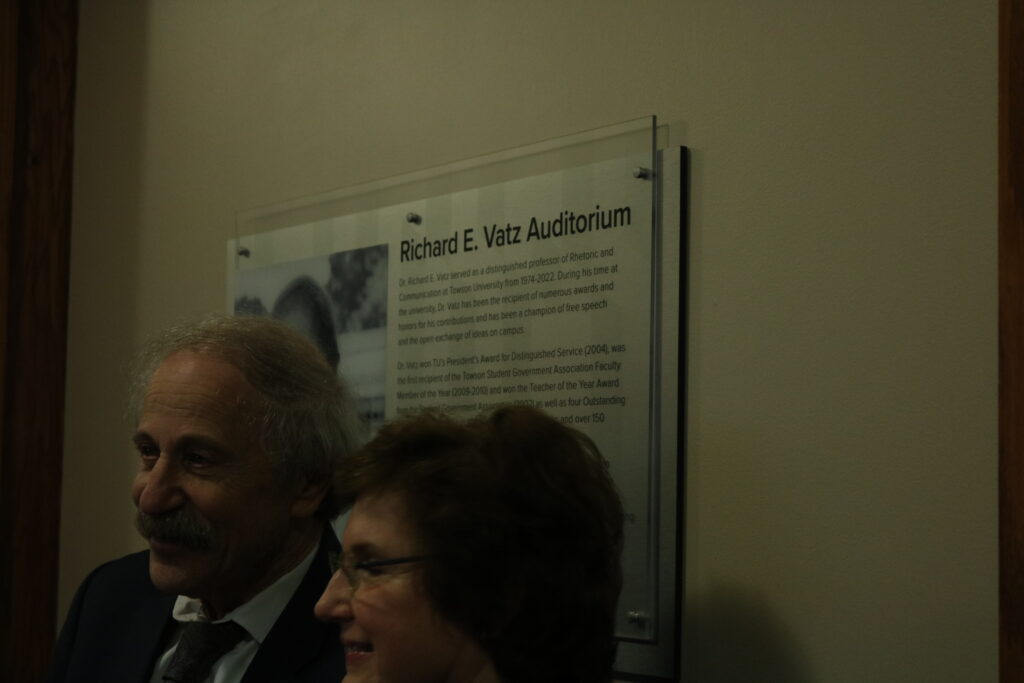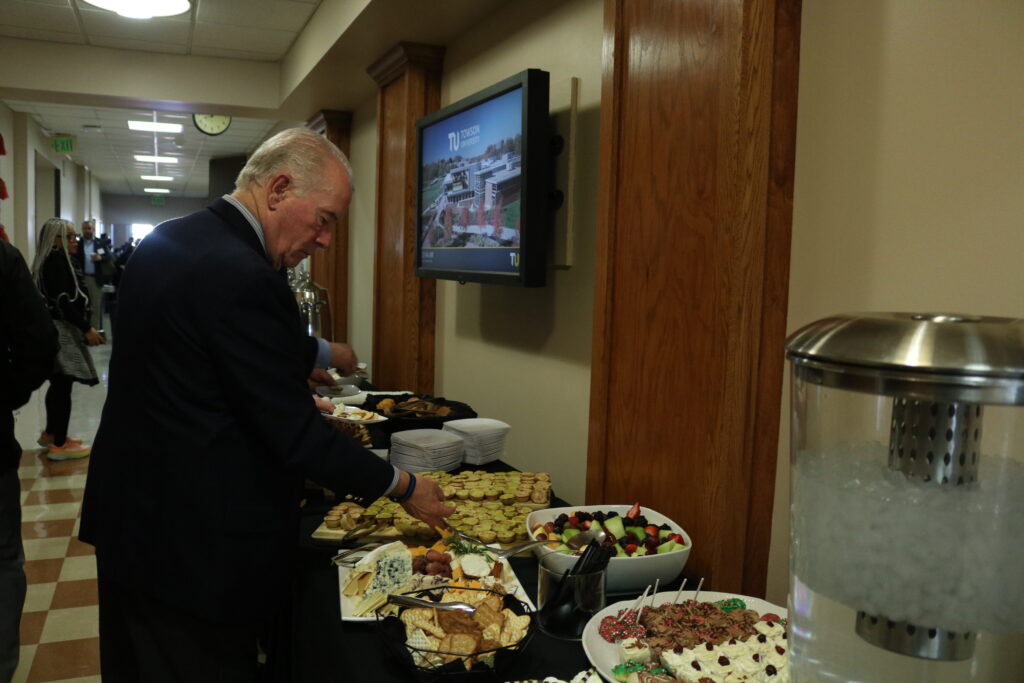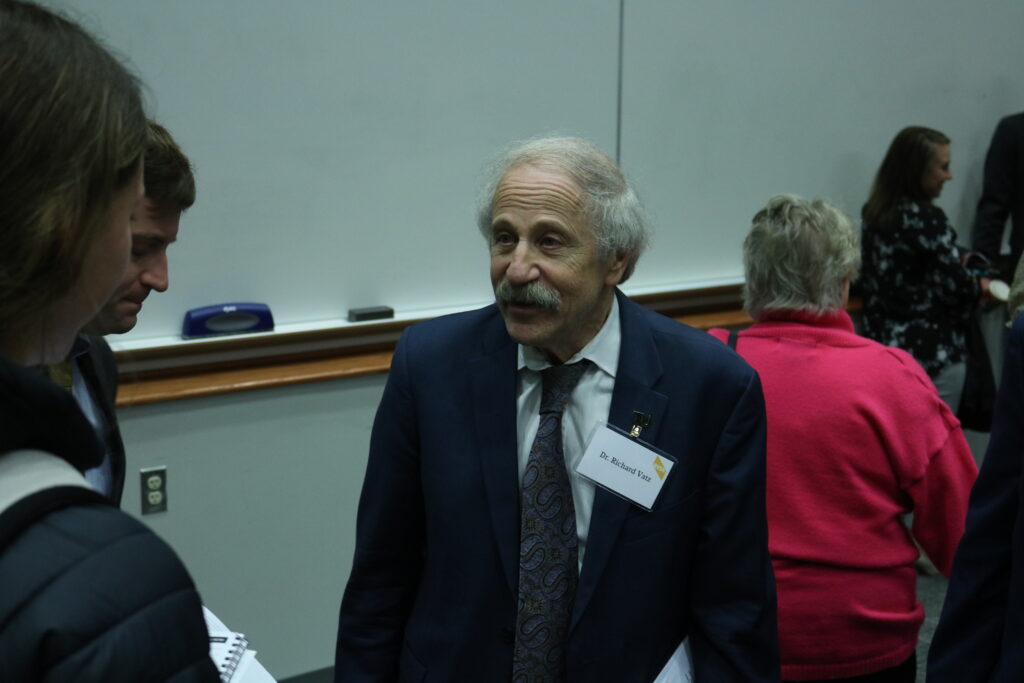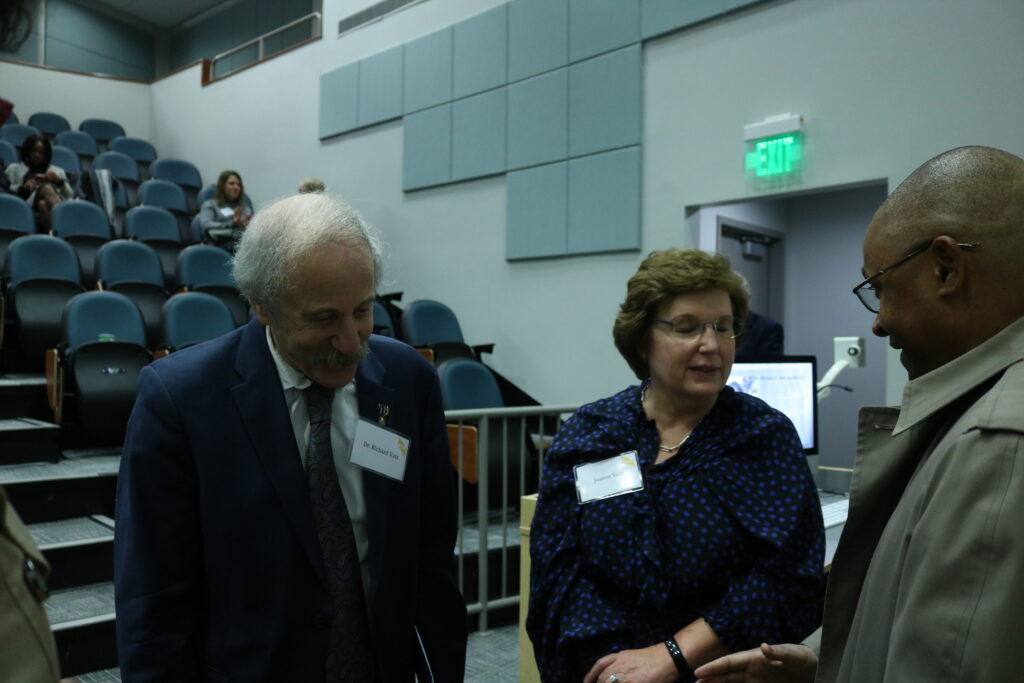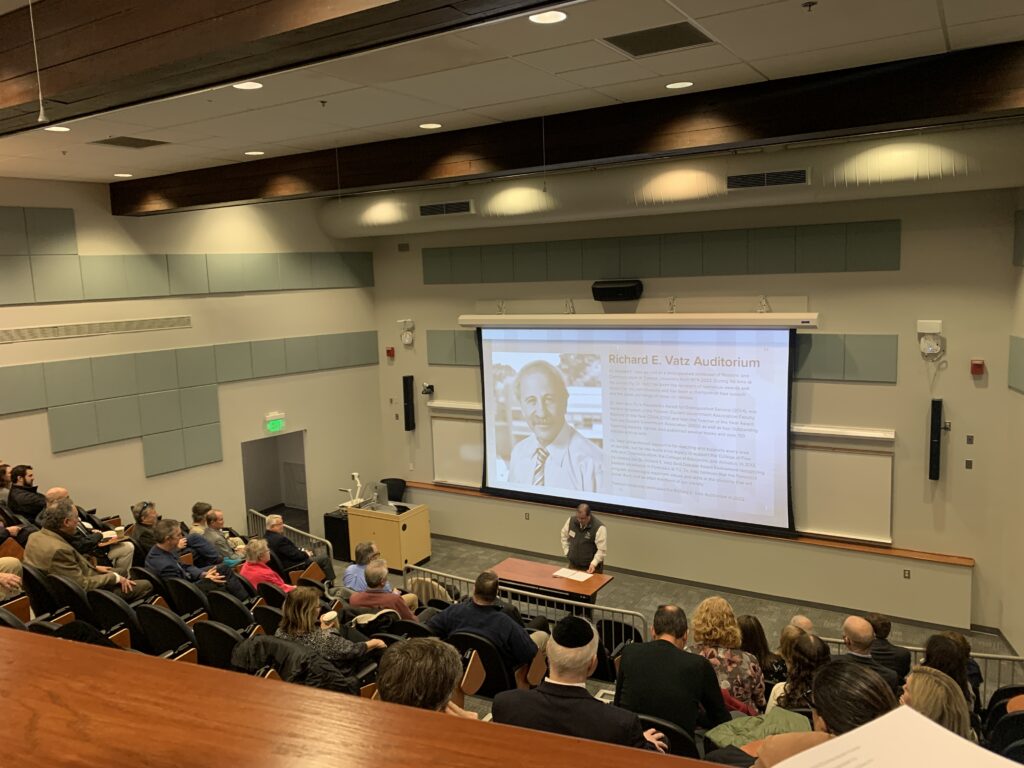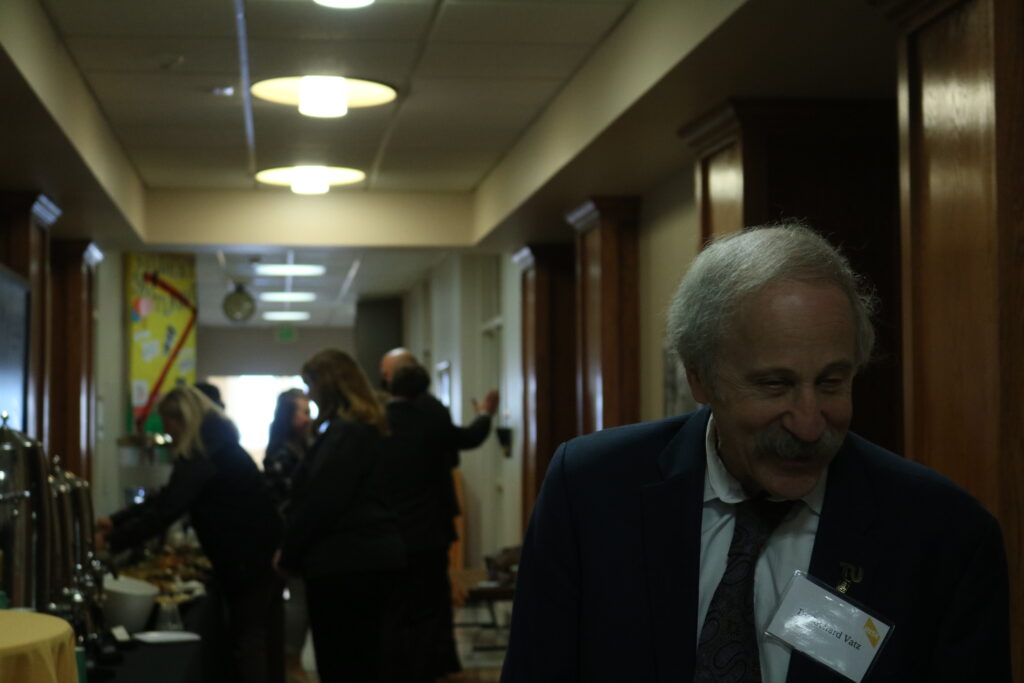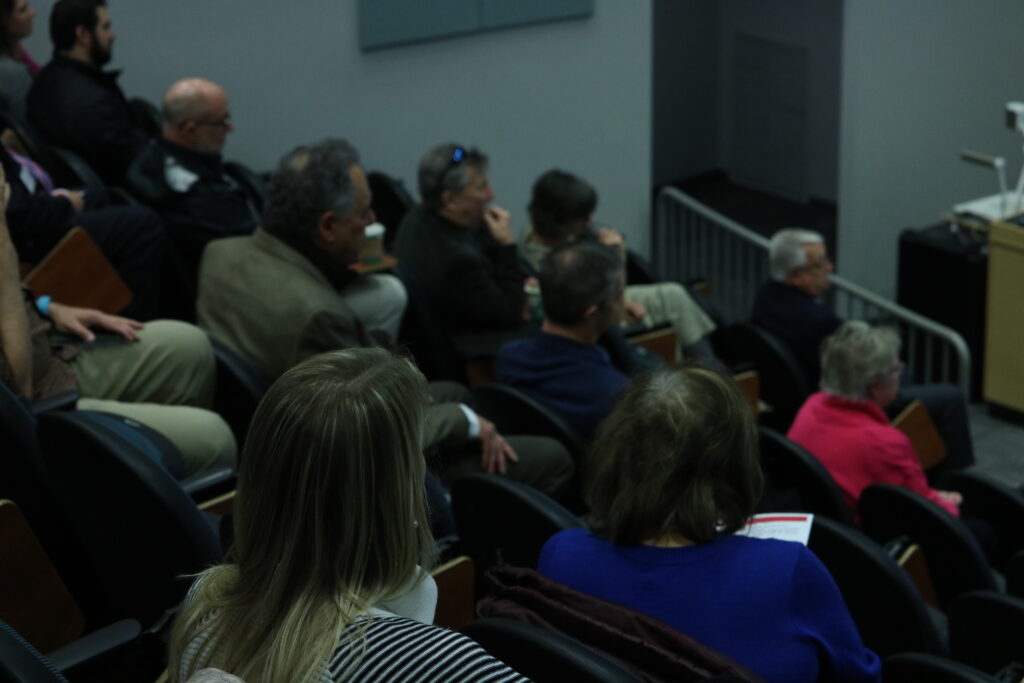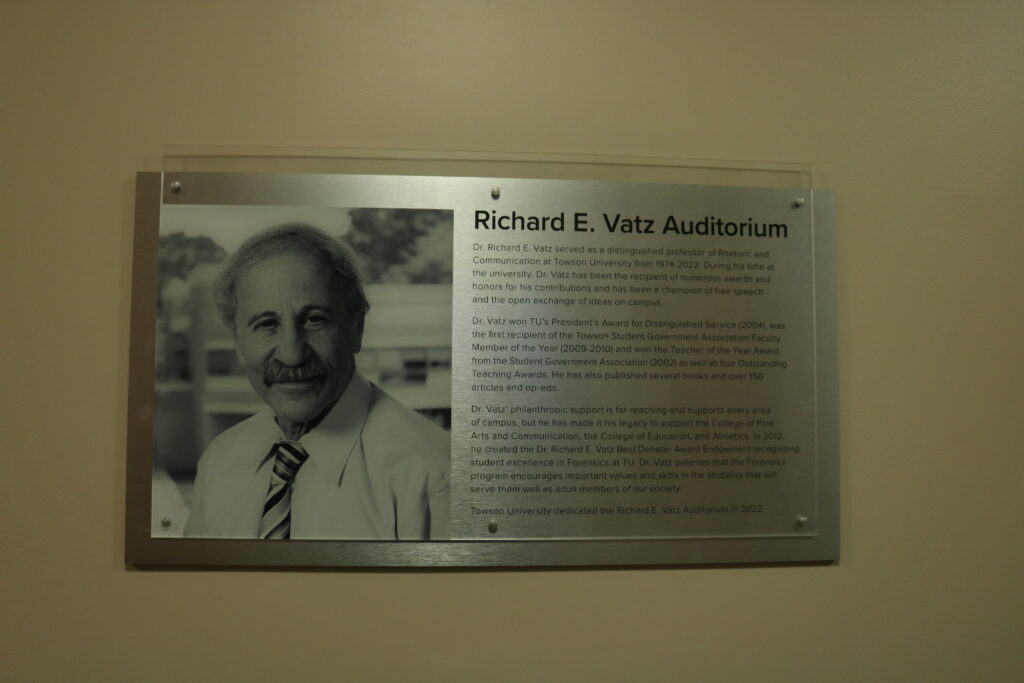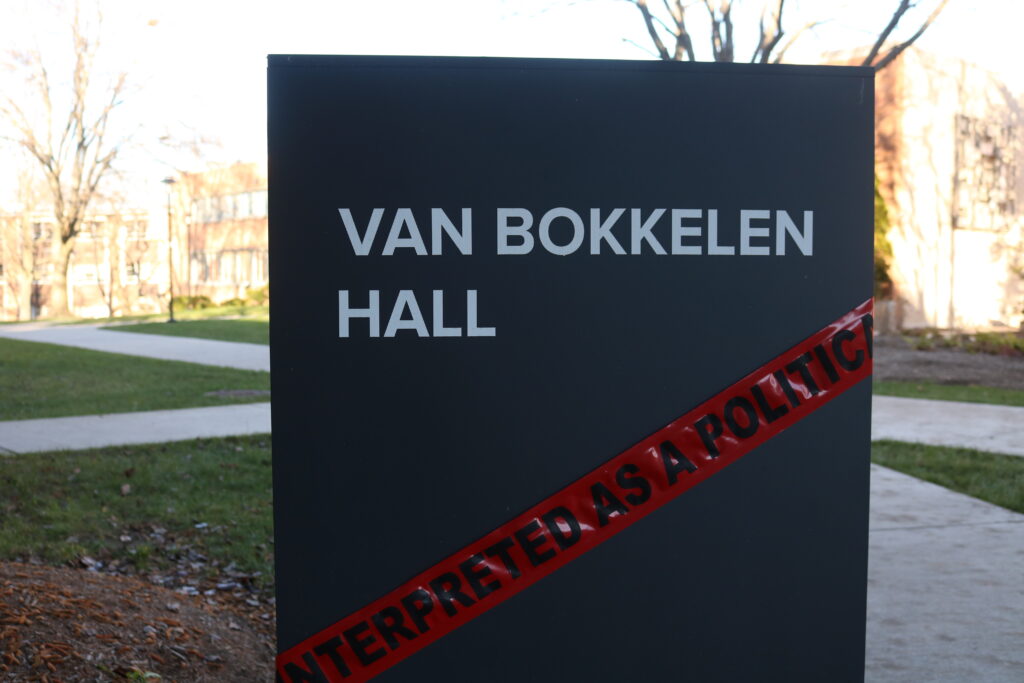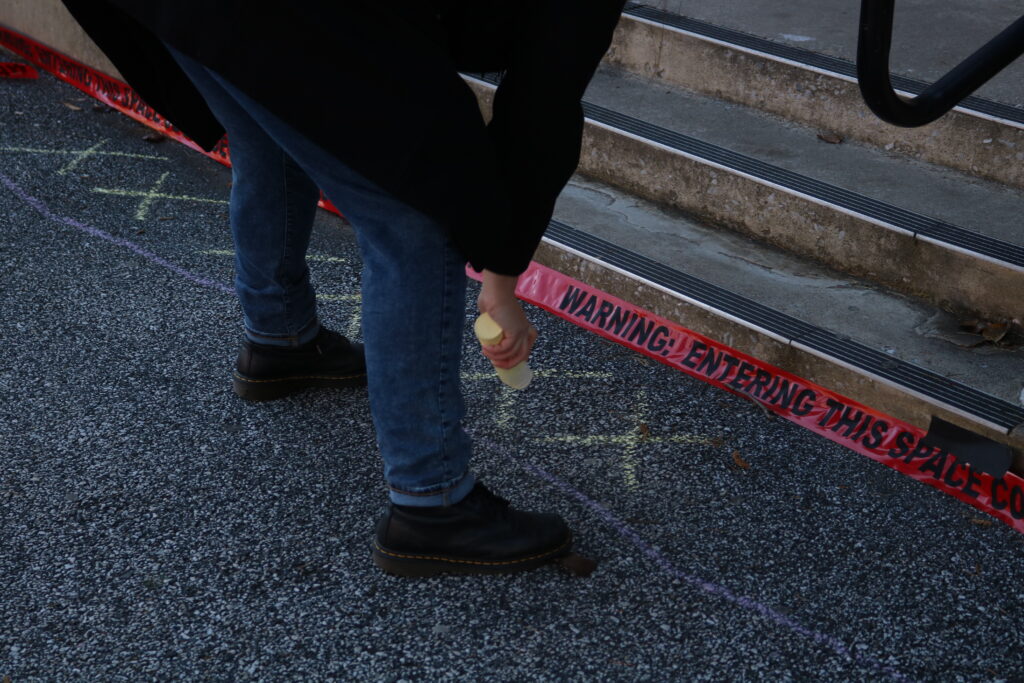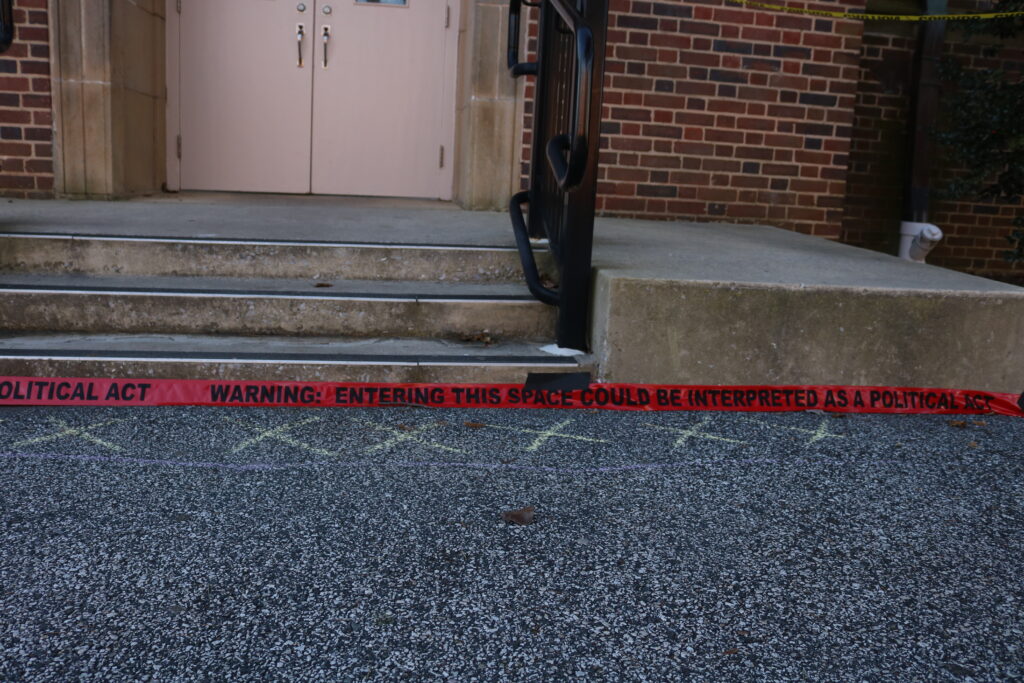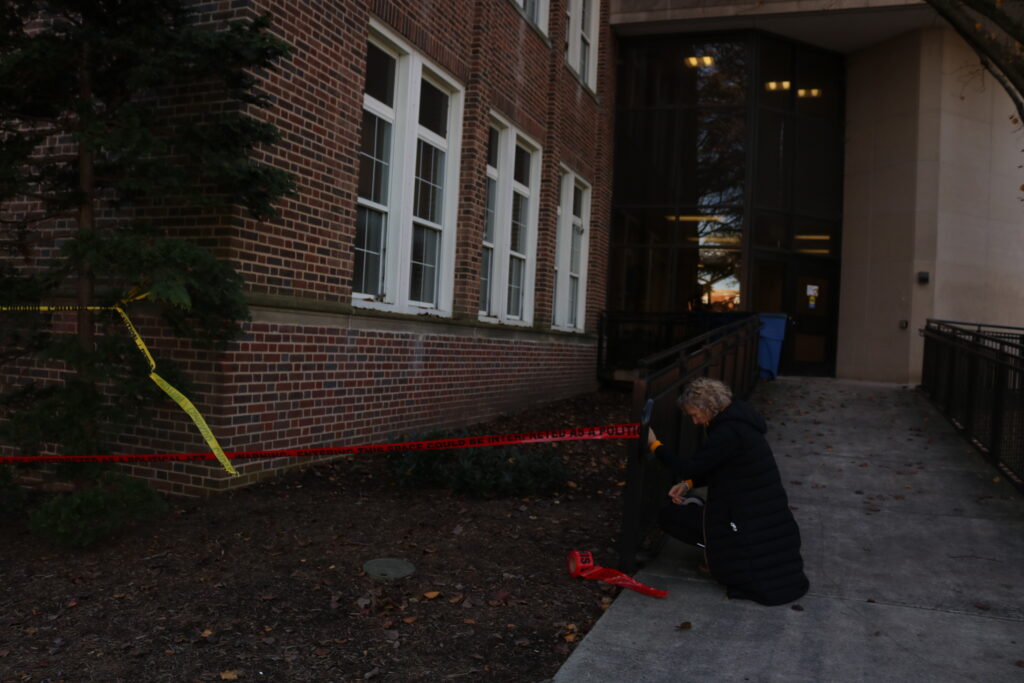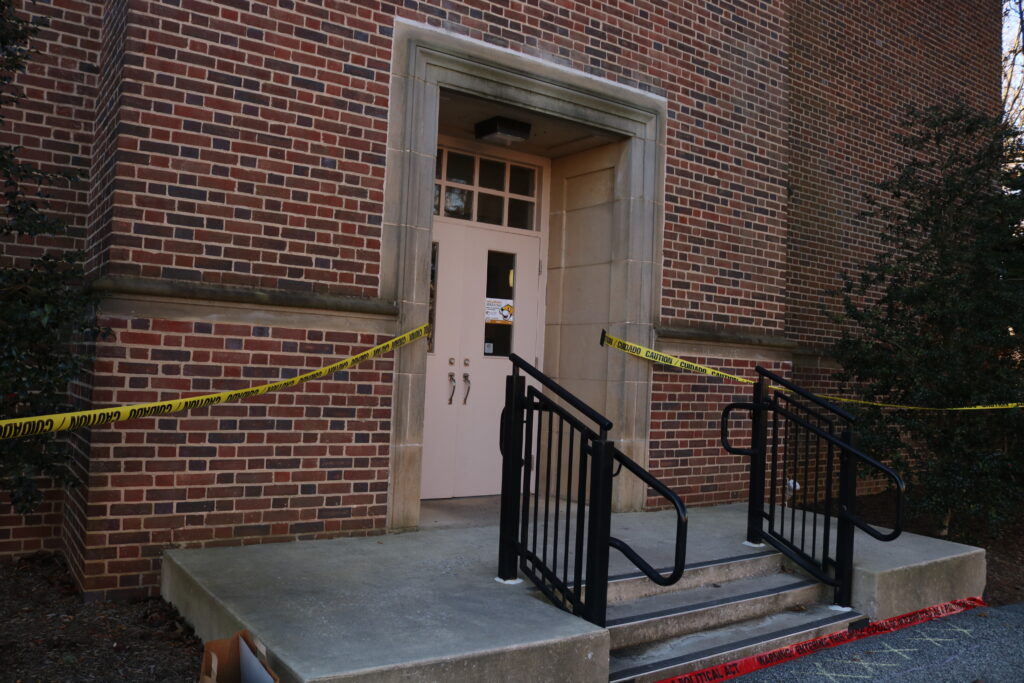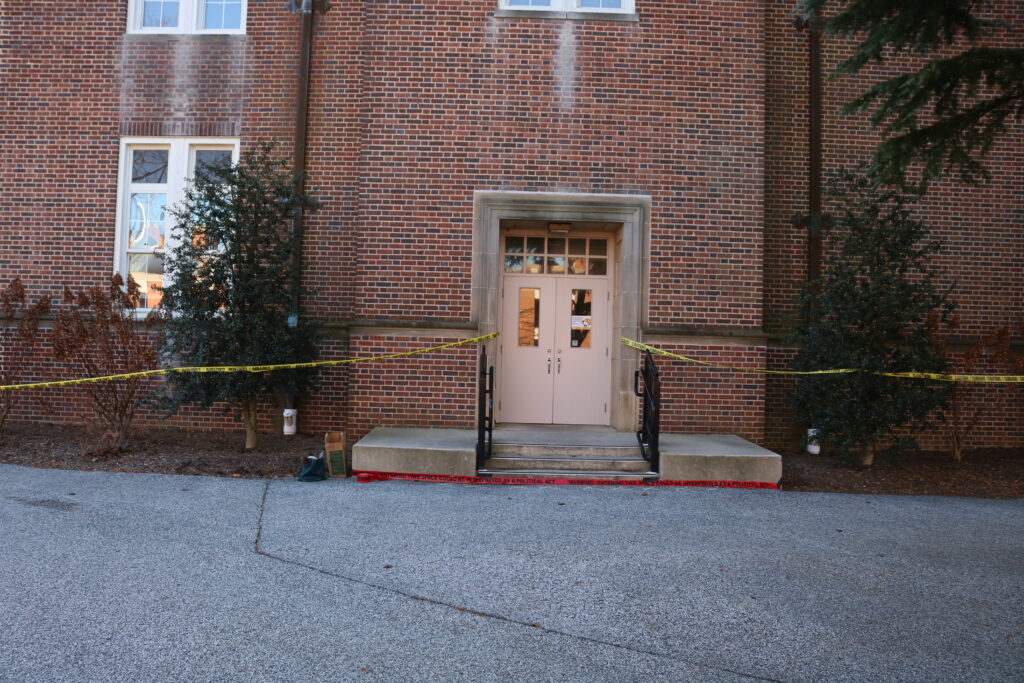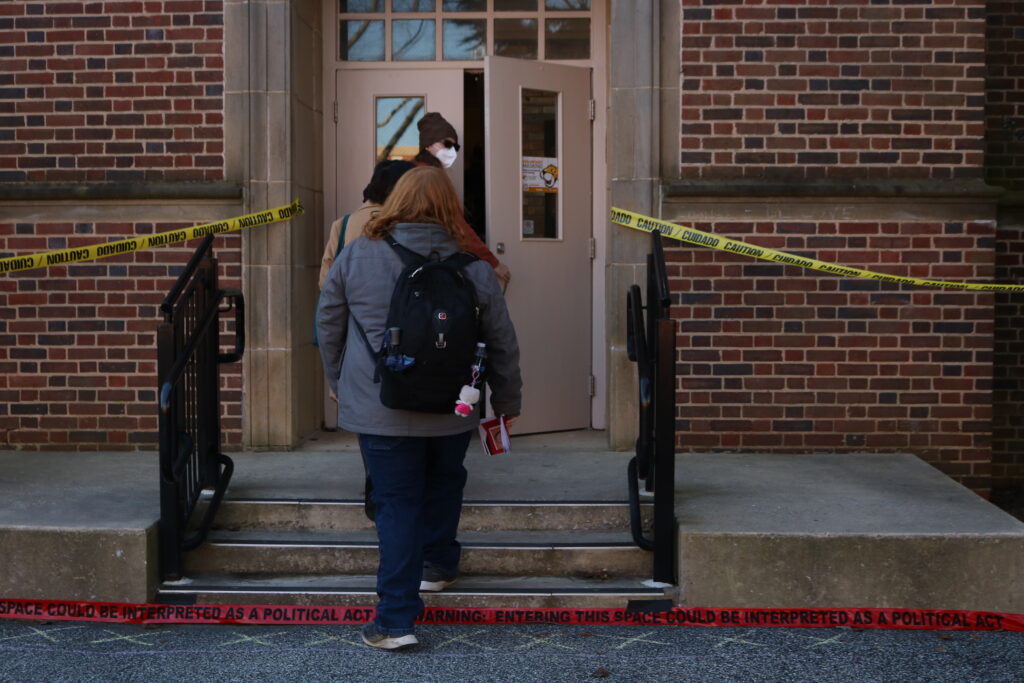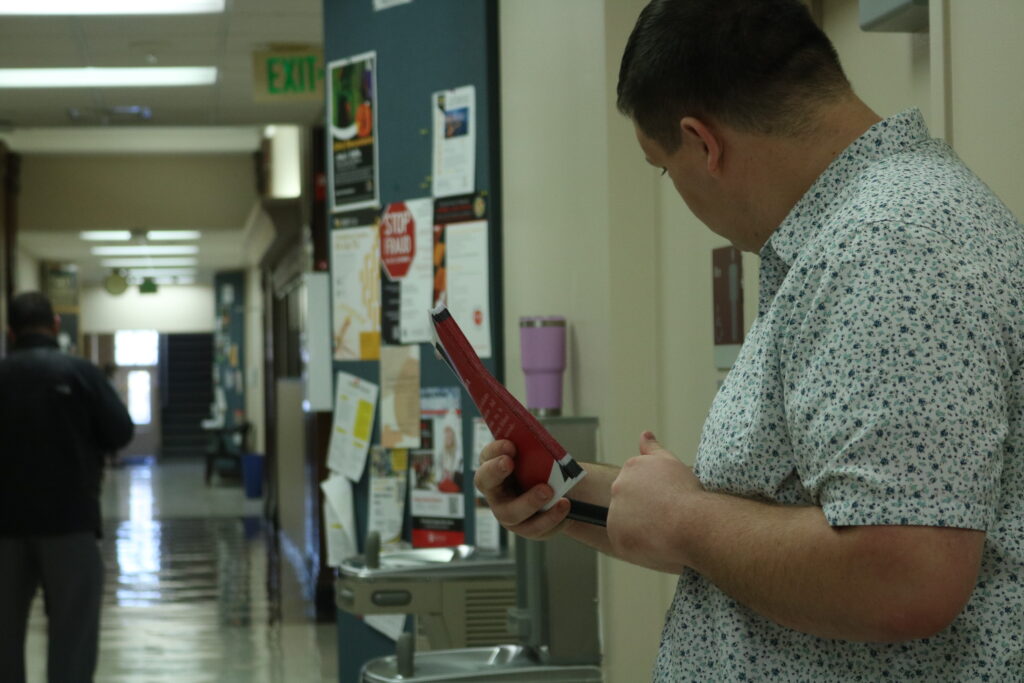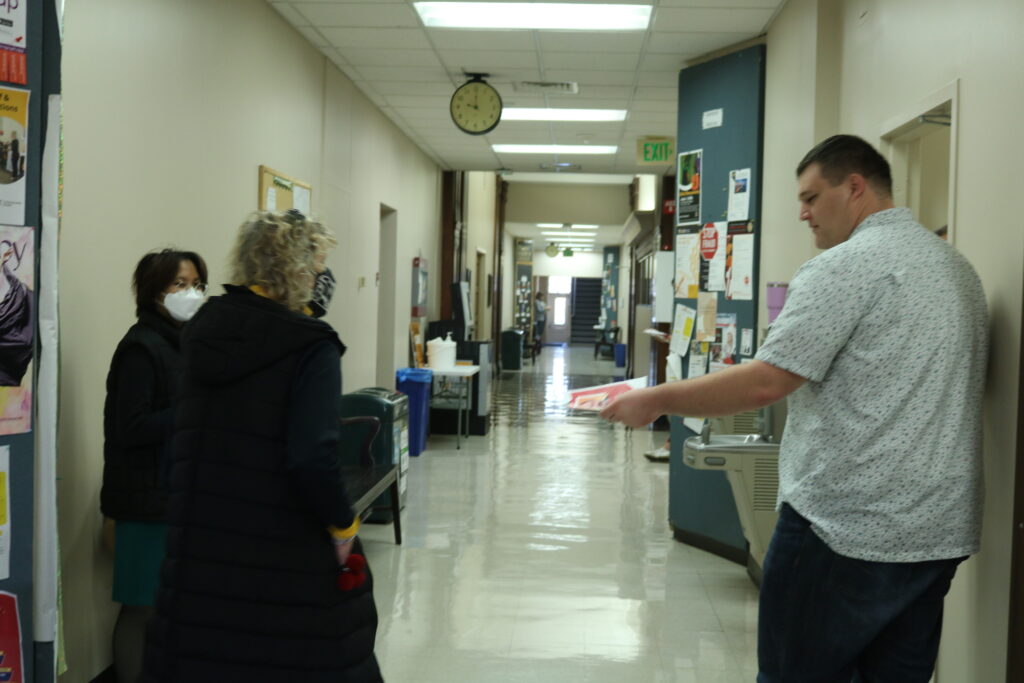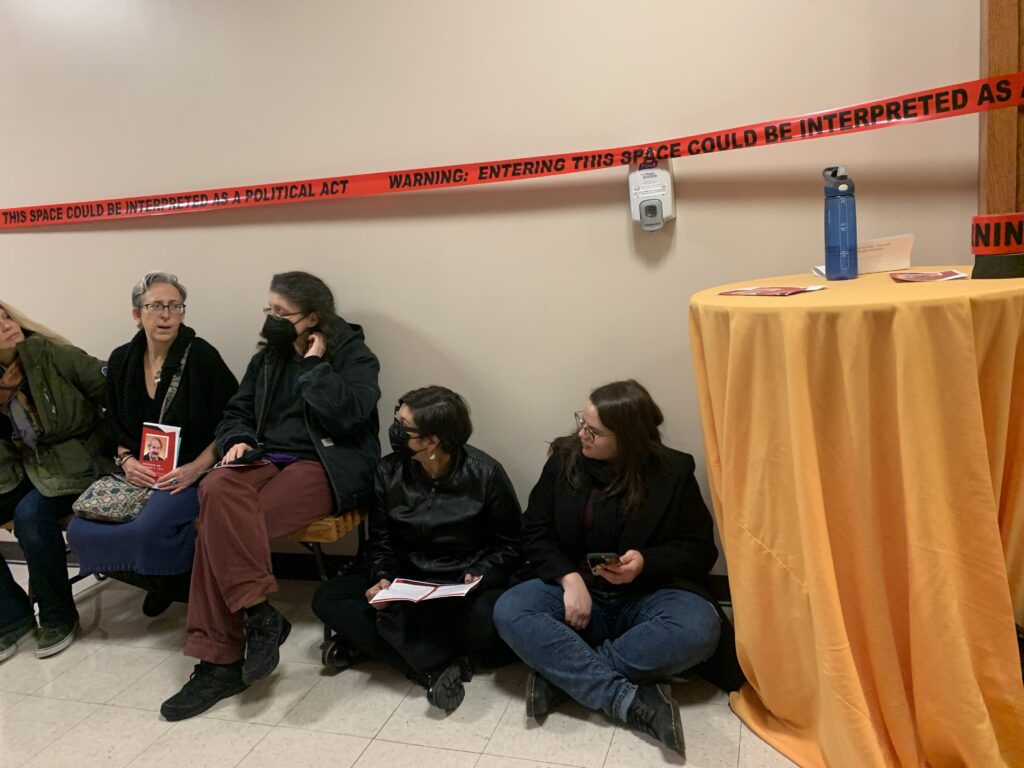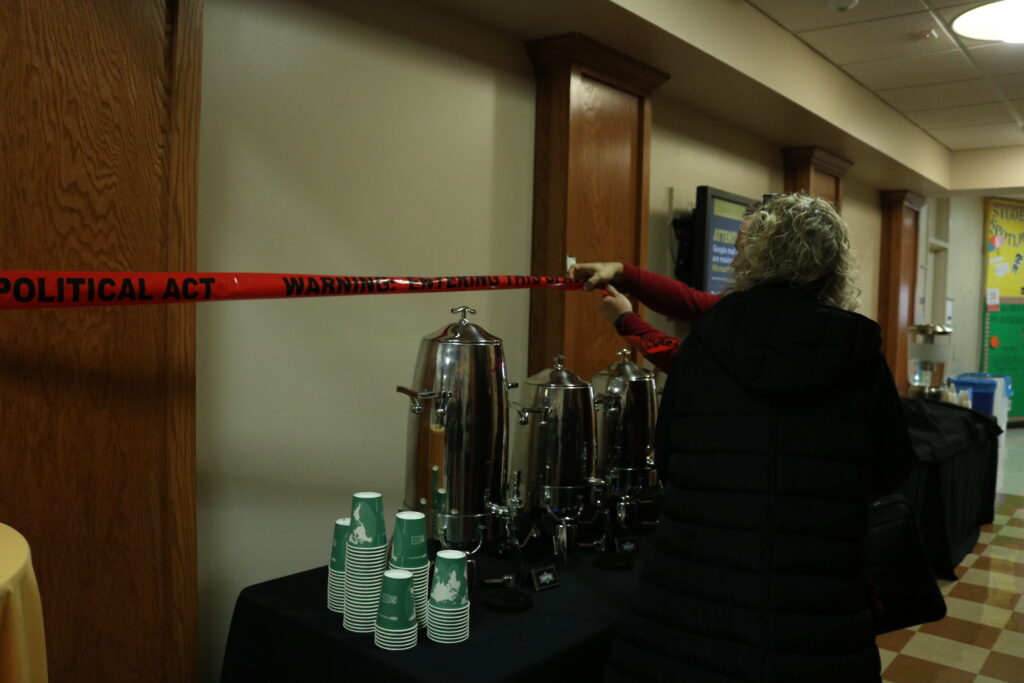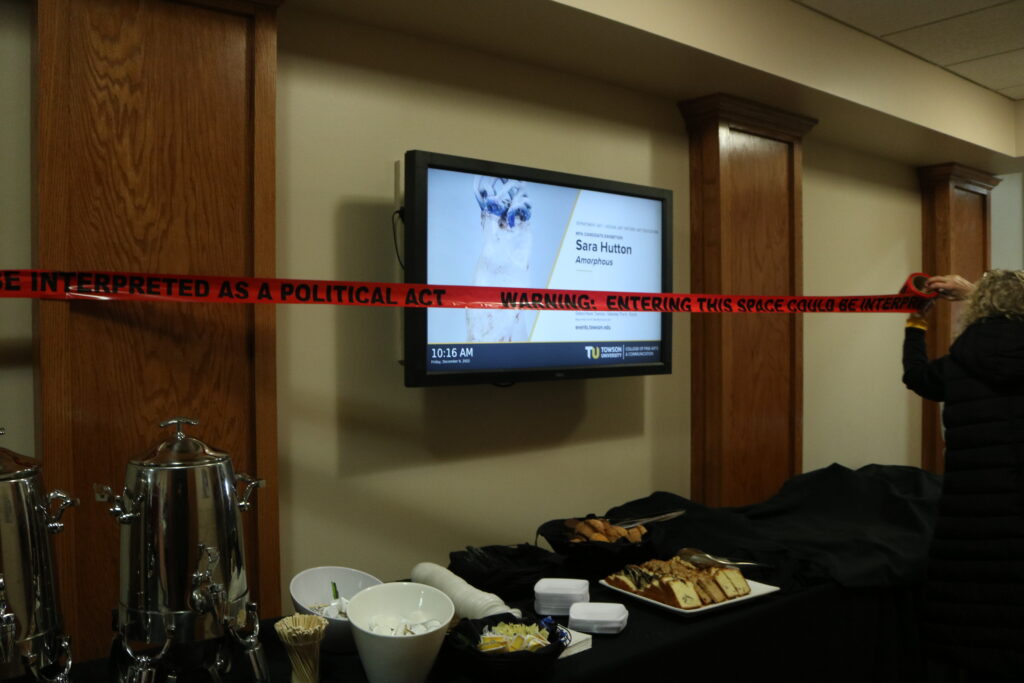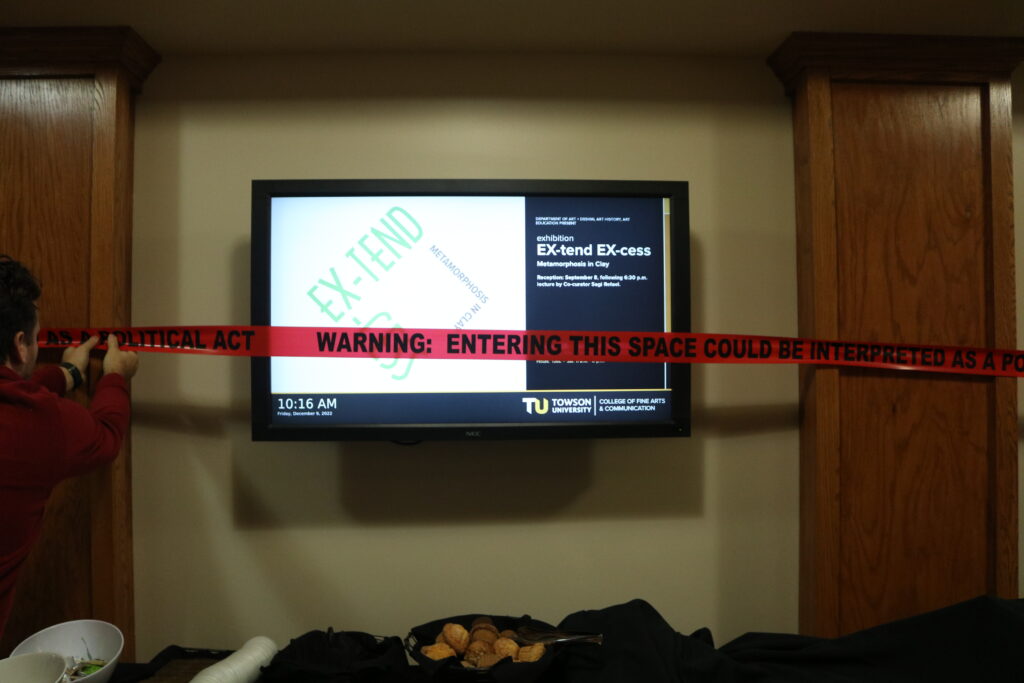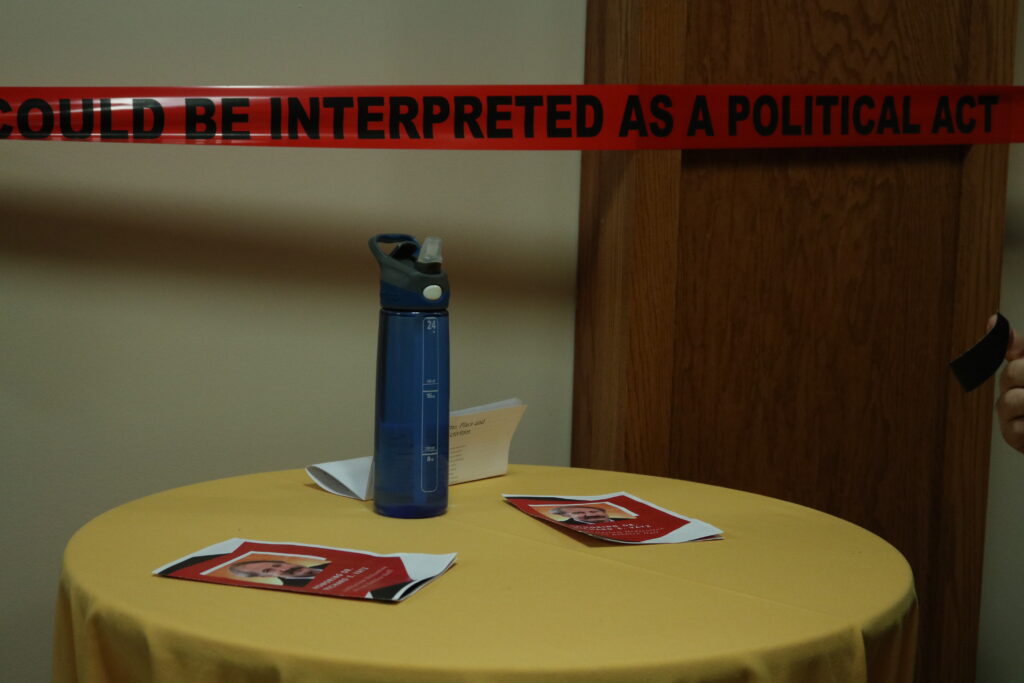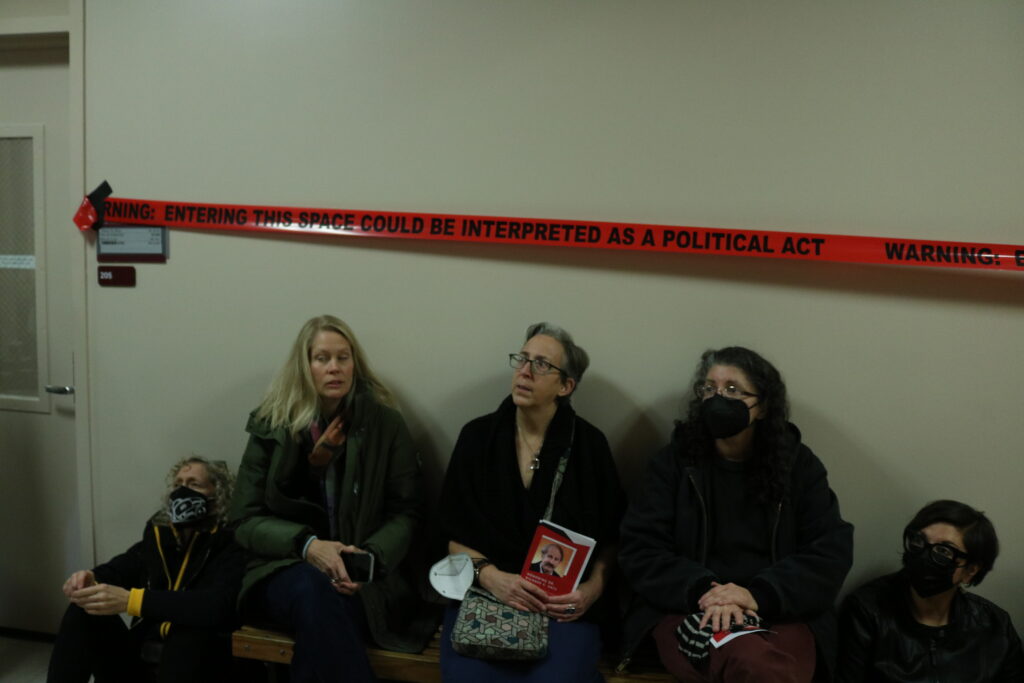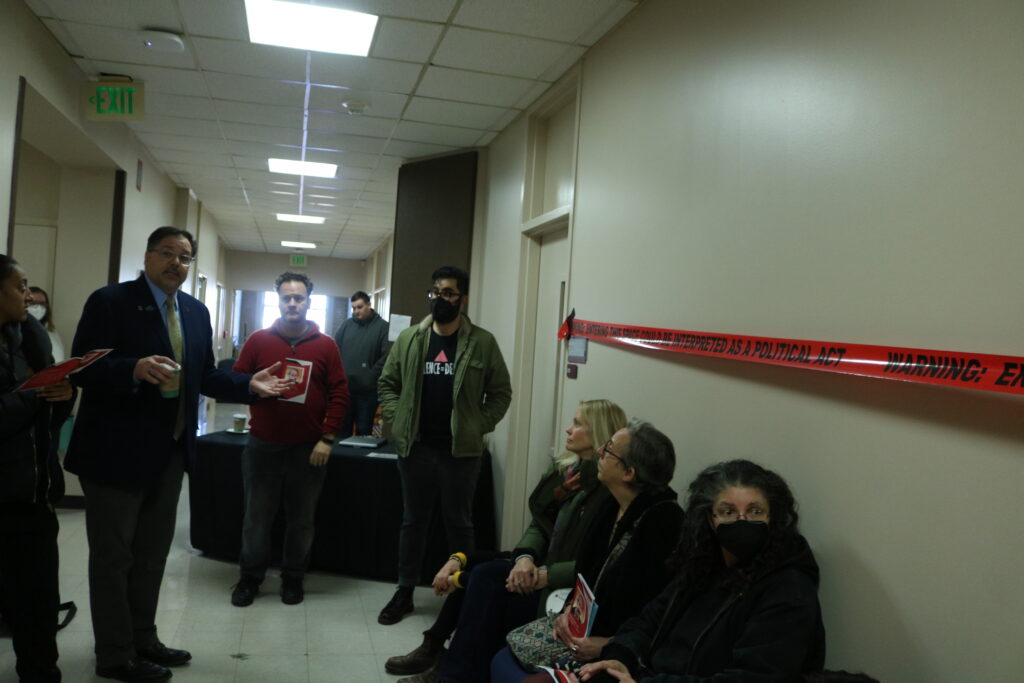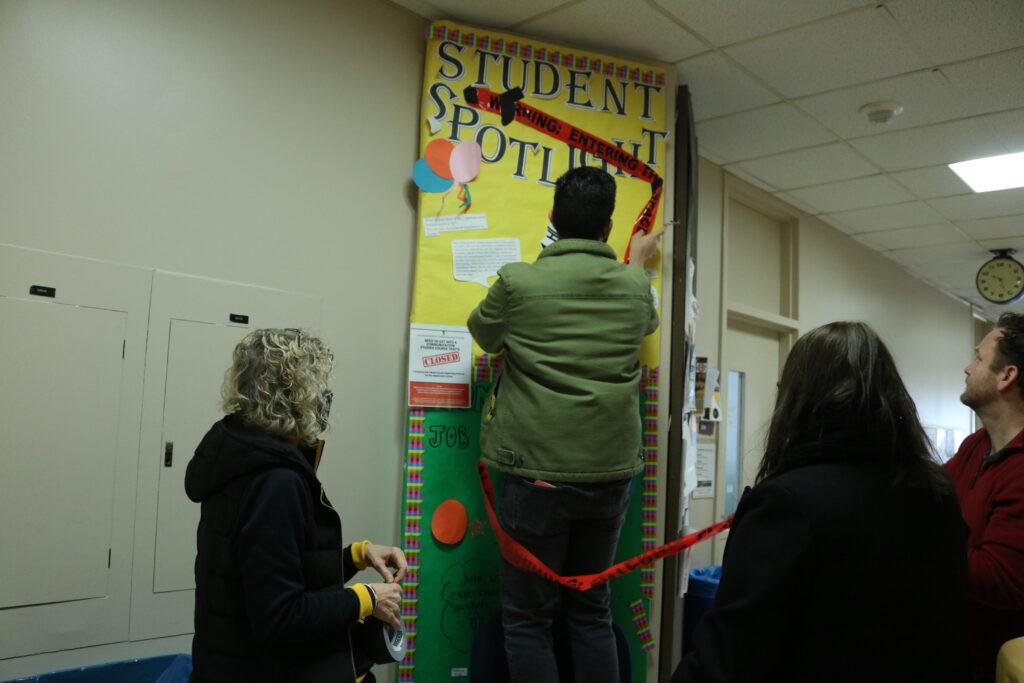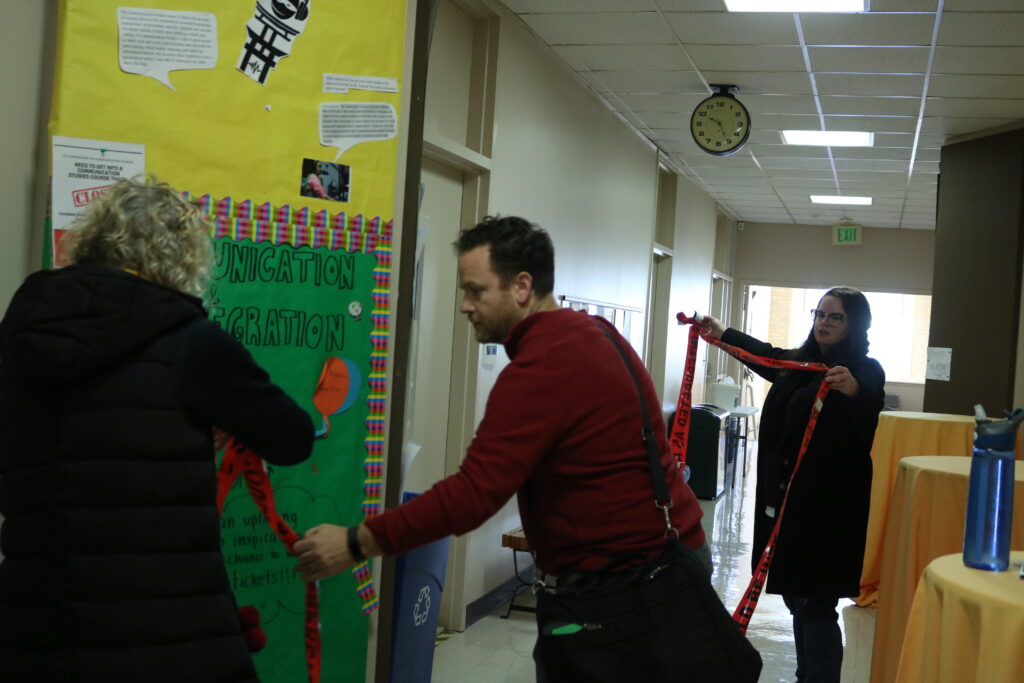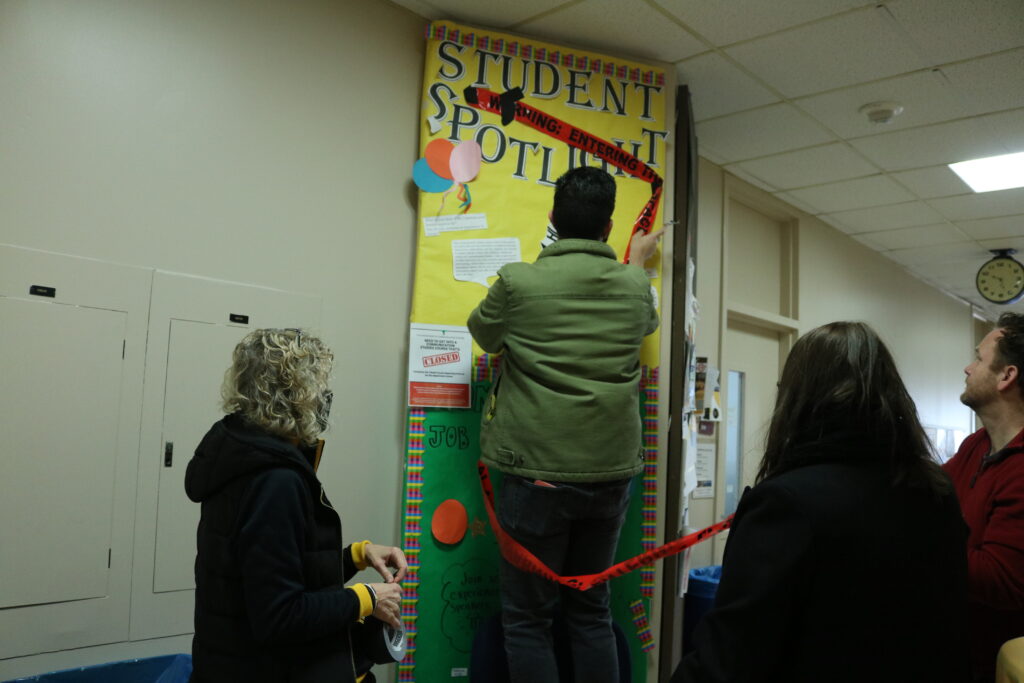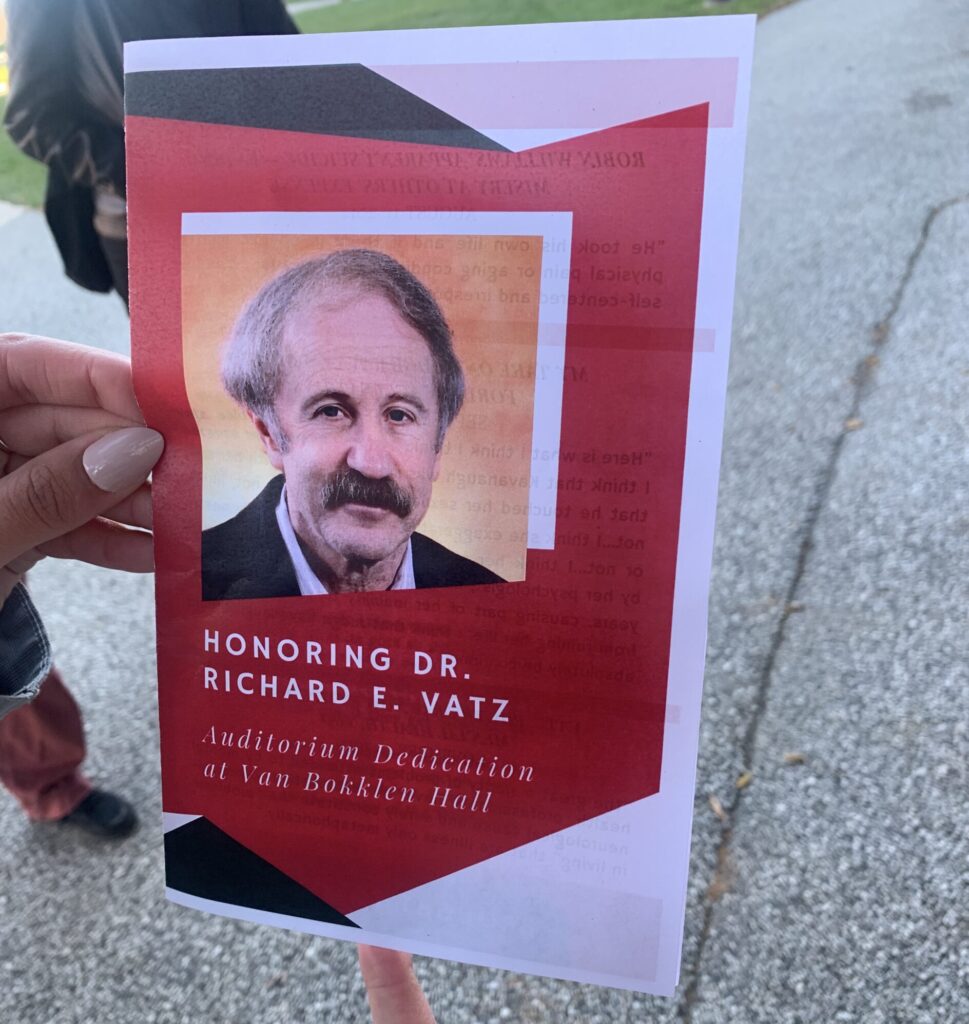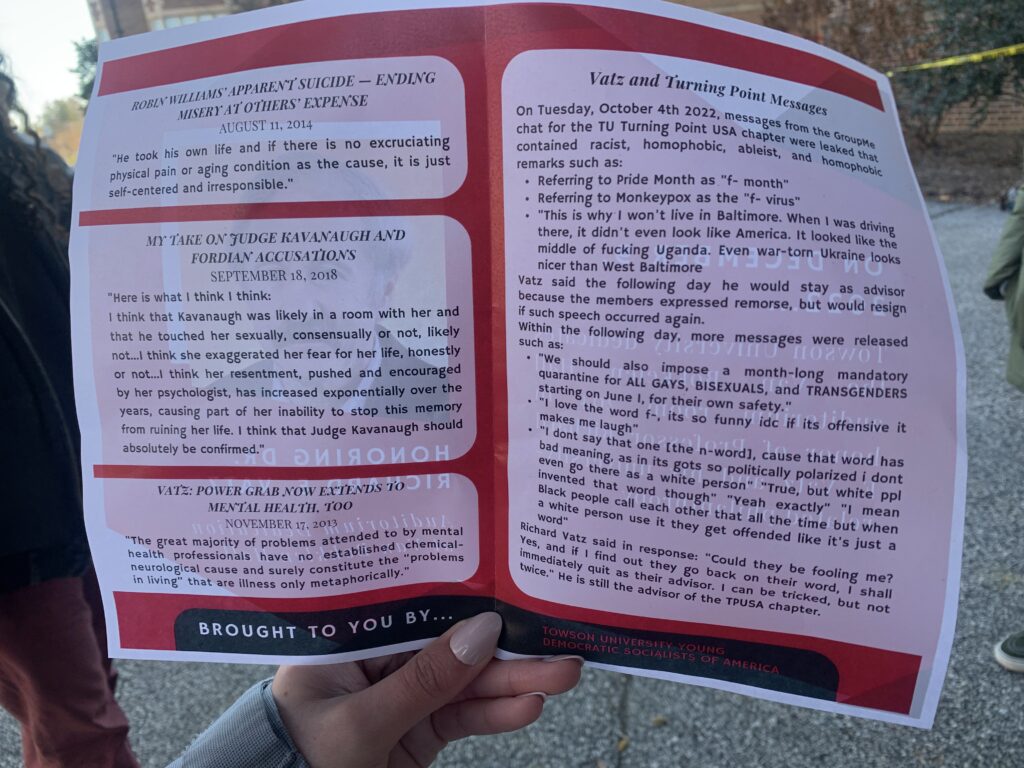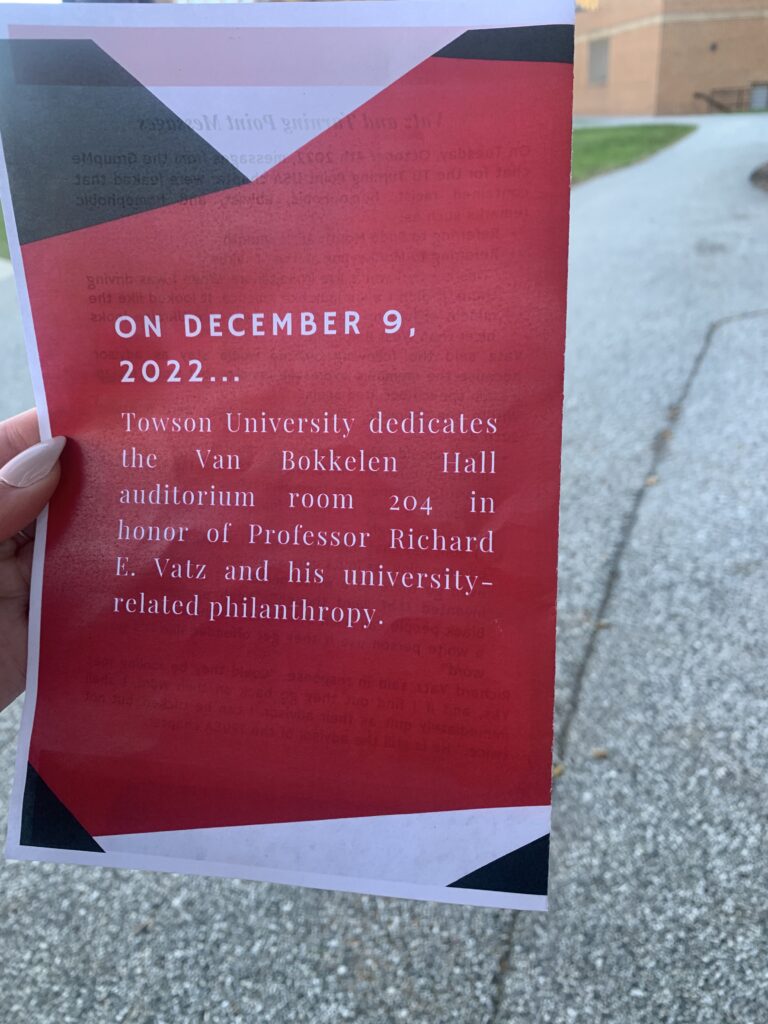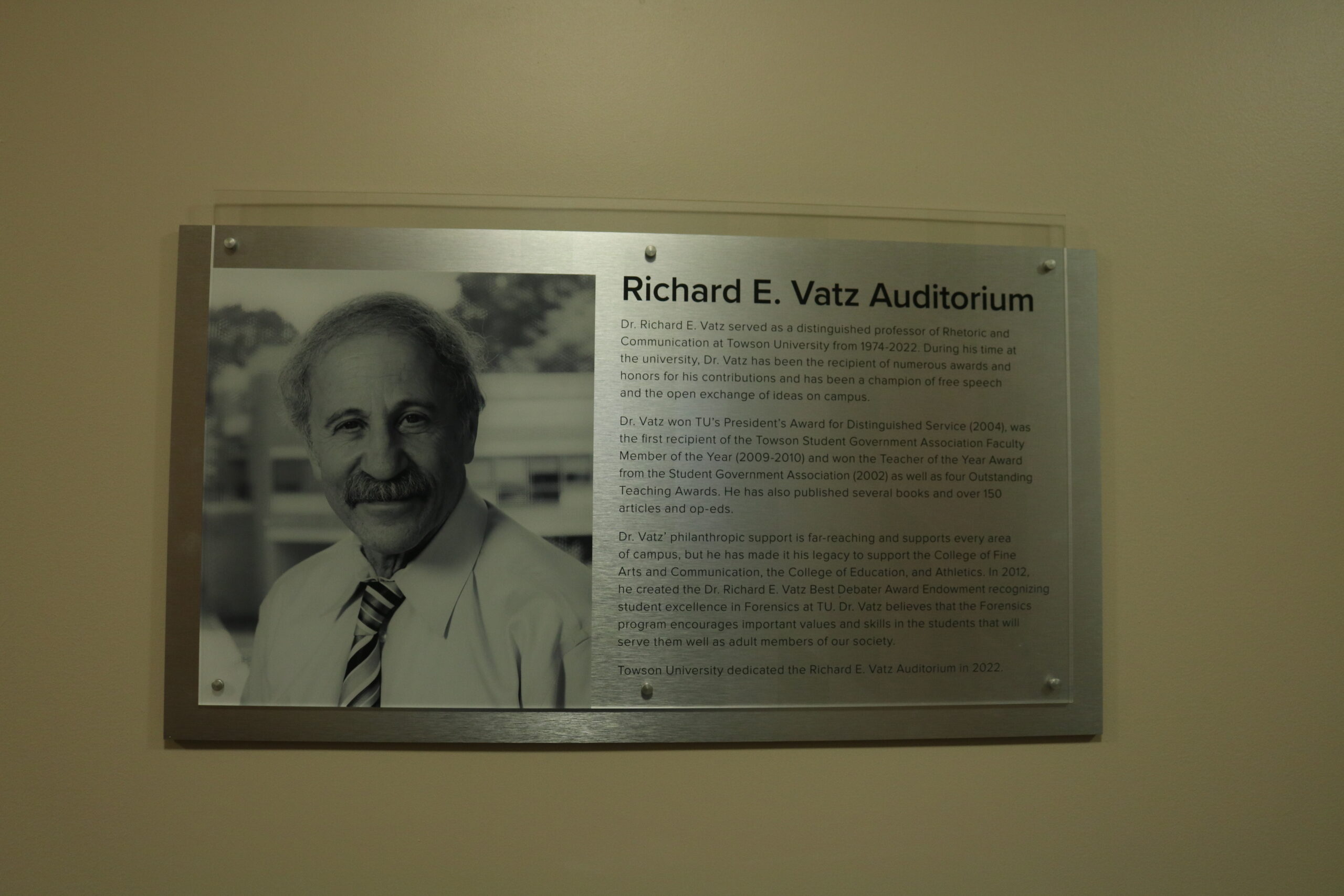
Towson holds dedication ceremony for Vatz auditorium; protests occur
By: Caitlyn Freeman, Gabriel Donahue and Courtney Ott
Towson University officially dedicated the Van Bokkelen Hall auditorium to Richard E. Vatz, a longtime professor and adviser of the embattled chapter of Turning Point USA, on Friday following several weeks of community outrage and requests for the university to reconsider the dedication.
The Ceremony
The dedication ceremony, attended by about 50 people, saw Vatz, a faculty member in the Department of Instructional Leadership & Professional Development, being honored for his tenure as a rhetoric professor and frequent donor to the university. He has taught classes in the auditorium for most of his 48-year tenure.
In his remarks, Vatz thanked attendees and said he hoped the auditorium signifies his time at Towson.
“When students know my name is associated with this room, I hope you’ll think of the room as representing a longtime teacher who has won many teaching awards, as many as any other faculty member,” Vatz said. “A professor who served the university 40 years in the [Academic] Senate. The professor has helped Towson students think, learn and get jobs and careers.”
The decision to dedicate the auditorium to Vatz, who plans to retire in January, was made five years ago in honor of his long history of donating to the university. One of Vatz’s gifts came with a request to put his name on the auditorium, a university spokesperson told The Towerlight.
“We’re just grateful for what you’ve done, for being such a champion of philanthropy and being so incredibly generous, thank you Dr. Vatz,” David Schwartz, a Towson alumnus and former student of Vatz, said during the ceremony.
One dedication attendee, who only identified as a staff coordinator, said she attended in support of Vatz.
“[The ceremony] was wonderful,” she said.
Background on Vatz and the dedication
The weeks leading up to the dedication ceremony saw many students and faculty publicly denouncing the dedication due to Vatz’s history of serving as the faculty adviser for student groups that have espoused white nationalism and bigotry.
Vatz is the faculty sponsor of Towson’s chapter of Turning Point USA, a conservative student organization. In October, leaked messages showing members of the far-right group using homophobic, racial and ableist slurs began circulating the campus.
Following the leak, Vatz came under fire for his decision to continue sponsoring Towson’s chapter of Turning Point USA, despite saying he’d step down if he saw evidence of bigotry.
He told The Towerlight he continues to advise the chapter because members expressed remorse and assured him the bigotry would not continue.
In 2012, Vatz also sponsored Towson’s defunct Youth for Western Civilization chapter, a far-right student group. The chapter, started by Towson alumnus Matthew Heimbach, sparked controversy by chalking “white pride” on sidewalks across campus, which led to Vatz resigning as an adviser.
Once the group dissolved, Heimbach started a White Student Union, which was not affiliated with the university.
Vatz addressed the controversy surrounding the Youth for Western Civilization and Turning Point in his remarks. He reasserted that if he were to find additional bigotry within the Turning Point chapter, he’d step down from his role.
On Dec. 1, several members of Towson’s Student Government Association, Academic Senate and Graduate Student Association condemned the naming in a joint statement.
Later, on Dec. 7, less than 48 hours before Friday’s ceremony, 20 faculty members in the Department of Speech-Language Pathology & Audiology signed a letter to President Kim Schatzel, DeFilippis and other administrators requesting officials not go through with the naming.
Outside of his club sponsorship, Vatz was the longest serving member of the university’s Academic Senate and a recipient of several honors, including the 2004 President’s Award for Distinguished Service, according to his faculty biography.
He is known locally for his conservative advocacy and commentary in local media and has authored several books.
The protests
Approximately eight faculty members spanning several departments protested the ceremony, including Academic Senate Chair Desirée D. Rowe.
The protestors lined the outside of Van Bokkelen hall with red and yellow warning tape and chalked “X’s” at the building’s entrances.
“As a faculty member in the department of communication studies, I stand in solidarity with my colleagues and our students in opposition to the naming of VB 204 after Prof. Rick Vatz,” Rowe said in an emailed statement Saturday.
Later, six protestors, including Rowe, went inside to the hallway in front of the auditorium and sat in protest along the wall facing the auditorium. They hung red tape that read “Warning: Entering this space could be interpreted as a political act” across the wall over the event’s food table.
Michael Tristano, a Professor within the Communication Studies department, protested the event and said he feels Vatz’s philanthropic contributions to the university don’t outweigh some of his actions.
“Richard Vatz is a person who spews problematic and hatred, specifically ideologies,” Tristano said. “Each semester, I hear stories of how he makes students feel, what he says to students, and it’s atrocious that an institution would name something after him despite how much money he gives. It’s disgusting. And I think it’s wrong. “
The protestors were asked to leave the hallway because it was reserved for the event but were allowed to stand at a nearby classroom.
In addition to the professors, several members of Towson’s chapter of the Young Democratic Socialists of America stood at the building’s entrances and gave mock event programs to attendees as they walked in.
The mock programs for the event appeared inconspicuous from the outside but, when opened, included information about the leaked Turning Point messages and quotes from editorials Vatz authored.
“A lot of the people that were attending this event aren’t aware of Vatz’s history, so we wanted to educate them on that, and we also want to tell the University that this isn’t ok and that there are people here that aren’t going to support that,” YDSA Chair Richard Soucy said. “I think that it’s awful that this is happening.”
The group printed quotes from several editorials, including one posted in 2018 on redmaryland.com where Vatz discusses the appointment of Brett Kavanaugh to the U.S. Supreme Court. Upon his nomination, three women accused Kavanaugh of sexual assault and misconduct when he was in high school and college, Business Insider reported.
In his op-ed, Vatz asserted his support for Kavanaugh and urged the U.S. Senate to confirm his nomiation. YDSA included this snippet in the program:
“I think that Kavanaugh was likely in a room with her and that he touched her sexually, consensually or not, likely not,” Vatz wrote. “I think she exaggerated her fear for her life, honestly or not…
5. I think her resentment, pushed and encouraged by her psychologist, has increased exponentially over the years, causing part of her inability to stop this memory from ruining her life.”
The group also included op-ed’s where Vatz gives his opinions on mental health.
Soucy said the group decided to make the programs as it seemed like the best choice given the circumstances.
“Because we were realistic, we knew that the dedication was going to happen,” Soucy said. “We weren’t trying to prevent it from happening at this point, but trying to show that it’s not tolerated.”
They said the group did not use the funds they receive from the Student Government Association to pay for the programs.
In response to the protesting, Vatz said the faculty and students were within their First Amendment right to do so but disagreed about their actions leading up to the protest.
“I do think they ought to come more informed before they protest, and literally nobody has contacted me by email, contacted me personally, and I’m always willing to talk to people,” Vatz said. “Which means they don’t have the courage of their convictions because if they had the courage of their convictions, they would be willing to talk about it. So, I support the right to protest, but I just wish they were a little more informed.”

